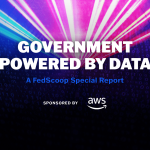Dataset demands and remote leadership among top challenges for CDOs during pandemic

The volume of demands for coronavirus-related datasets and communicating with staff in a remote environment were among the biggest challenges faced by chief data officers during the pandemic, C-suite advisers told FedScoop.
According to consultants and nonprofits canvassed, the responsibilities of CDOs expanded as the COVID-19 pandemic spread across the U.S. during early 2020, to include leading the flexible use of previously untapped data and working to establish a culture in which experimental data dashboards were used to help coordinate teleworking staff.
CDOs were also presented with the harder-to-grasp challenge of influencing department culture from behind their computer screen.
“[W]hile the role of the CDO was always important, the pandemic has highlighted just how important having a chief data officer managing and governing data across the federal agencies really is in practice,” said Nick Hart, president of the Data Foundation, a nonprofit that works closely with CDOs.
Hart continued: “[E]verything [during the pandemic] was happening at lightning speed, we were no longer in a position to wait a year for new data collection that could be linked to other government data sources, or even private-sector data sources.”
Agencies pulled together datasets at extraordinary speed to launch programs, such as the separate Department of Health and Human Services’ Protect Public Data Hub and Centers for Disease Control and Prevention COVID Data Tracker. Speaking at an event earlier this year, Kevin Duvall, acting chief data officer at the Department for Health and Human Services, described the challenge, saying the agency got “more comfortable” with datasets and the quality of data over time.
CDOs at pace had to consider a raft of ethical concerns, including how datasets might be used by lawmakers – and the way in which publication of such data might be viewed by teams internally.
“Collaboration between data visualization staff and software engineering teams really only happens if there is trust and knowledge that if any data is put out there [staff] will have the chance to validate it,” Grant Thornton public sector manager Tracy Jones told FedScoop.
“Other agencies I work at have very public-facing websites and public-facing data, and there are concerns on that front: Do agencies want to put data out there that constituents and policymakers at a higher level are going to be looking at?” Jones added.
Under a data ethics framework published in late 2020 as part of the Federal Data Strategy, agency data leaders are expected to understand and disclose any known limitations, defects, or biases — a challenge that CDOs had to embrace while working to respond to huge demands from their agency leaders and lawmakers.
According to Jones, one of the only ways to overcome internal concerns between teams over the publication of datasets is to foster a high level of communication. “You always want to understand: What is this data, how is it going to be used?”
In addition, the advocate role of the CDO — the ability to take staff on a journey towards the more effective deployment of data — also came under pressure during the pandemic, according to Jeff Lawton, Grant Thornton’s lead for enterprise information management solutions.
“I think that COVID has essentially hamstrung their ability to some degree, where they can’t use the full power of their charisma, their charm — because that’s part of the CDO position to get people to do something I want them to do that they are not normally doing,” he said.
On top of this, data leaders across federal agencies over the last 18 months have had to lead experiments with new datasets to help move staff to an all-telework environment during the height of the pandemic.
Speaking with FedScoop, one consultant described a rise in demands for more creative analytics from data leaders to afford more insight into exactly how staff were working outside the office. CDOs have had to lead the charge on the internal use of metrics, where it is efficient and makes sense within the teleworking environment.
“[We saw] a shift towards really trying to understand productivity…beyond maybe just the simple timecard entry. What are the ways that we can pull data to validate that we’ve all been productive in this engagement,” said JD Walter, a former HHS modernization adviser who is now executive vice president of solution optimization and execution at Golden Key Group.
Above all, however, Lawton added that one of the biggest determining factors in the success of a CDO — during the pandemic but also more widely in their role — has been attitude. He described the enthusiasm of one current, successful CIO as “infectious.”
“When we asked her what she wanted to have achieved in a year’s time, she said ‘I want people to have fun working on data governance,” Lawton said. “Who doesn’t want to be part of that group, which has that positive energy.”

This story was featured in FedScoop Special Report: Government Powered by Data - A FedScoop Special Report






